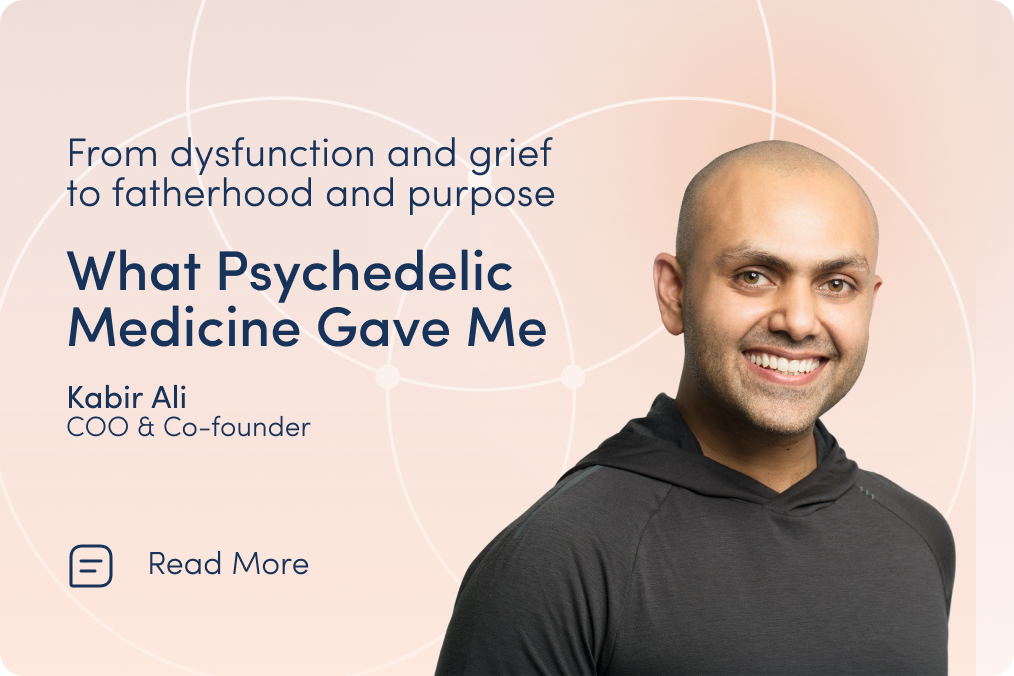
Culture, Emotion, and Psychedelic Healing: A Conversation with Haleh Keypour, LMFT
At Mystic Health, we believe deeply in the importance of culturally attuned mental health care. In our recent webinar, we had the honor of speaking with Haleh Keypour, a licensed psychotherapist with over 20 years of experience supporting individuals through trauma, mood disorders, intergenerational pain, and identity issues.
Haleh, who brings both clinical expertise and lived experience as an Iranian immigrant, joined Dr. Houman Farzin to explore how culture shapes emotional expression and how psychedelic therapy might offer a new path for healing. Below are some key takeaways from their heartfelt and illuminating conversation.
Culture Shapes the Way We Feel and Heal
Haleh shared growing up in post-revolution Iran and then immigrating to the U.S. as a teenager left her with a profound sensitivity to the complexities of cultural identity. “On the one hand I wanted to quickly assimilate and be a part of the American culture. On the other hand, I felt extremely loyal and physically still very tied to the Iran I had left behind. ”
This cultural tension is not just a matter of language or surface-level customs, it seeps into how emotions are expressed, processed, and perceived. Shame and guilt, in particular, are deeply embedded in many Iranian families, often complicating the path to emotional vulnerability and healing. As Haleh noted, “Letting go of defenses could mean they could lose their place in the family” , devastating the existing family dynamics. This is one example of consideration in psychotherapy and the attempt to challenge defenses that are strongly tied to cultural identity.
Psychodynamic Therapy Through a Cultural Lens
Haleh’s work is rooted in a psychodynamic approach that honors the unconscious, relational, inherited, and often unspoken aspects of a person’s emotional life. She emphasizes that these therapeutic tools must be adapted to the cultural context of each client. She introduced tarof, a cultural etiquette unique to Iranians. It embodies expectations for accommodations of others’ needs before one’s self. It is denial of one’s preferences which may otherwise be interpreted as selfish or vulnerable. “Tarof is a term that is particular to Iranians, and it is about offering and deferring to someone else's benefit and needs, it’s about the sense of selflessness... but it also is a way to still hold on to some sense of defense mechanism against joint vulnerability. ” she said.
Recognizing this, Haleh finds creative ways to meet her clients where they are. This might mean interpreting body language as an entry point to feelings, exploring cultural metaphors and proverbs, or gently confronting patterns of avoidance that are wrapped in politeness. “You have to be gentle but be inquisitive and curious about it... engage them in the curiosity about their defenses, ” she added.
In therapeutic settings the delicate balance between authority and humility is where the value of clinician’s cultural experience comes to light. It’s this sensitivity to both the client’s defenses and the therapist’s own role that shapes culturally attuned psychodynamic work.
The Psychedelic Potential: Accessing the Depths
Psychedelic-assisted therapy, particularly with ketamine, offers a unique way to bypass some of those ingrained defenses. Haleh and Dr. Houman discussed how ketamine’s ability to induce non-ordinary states of consciousness can open access to repressed emotional material that talk therapy alone may not reach. “In psychedelic states, the usual rules of politeness and presentation soften, ” Dr. Houman noted.
Haleh agreed, highlighting how powerful this can be especially when it integrates elements of client’s culture. For example, music and poetry, central components of Persian culture, can serve as vehicles for emotional expression during or after a psychedelic journey. “All those musicians you mentioned... their music is very melancholy. That sense of longing, that sense of melancholy is also very much embedded in the psyche and the mind of Iranians. ”
Shame, Guilt, and Identity in Iranian Communities
One recurring theme in the conversation was how shame and guilt function differently across cultures, and how this affects people’s willingness to seek therapy. “Iranian men traditionally hold back from going to psychotherapy… shame is a very big factor. ” Haleh noted.
In these cases both Haleh and Dr. Houman have found that framing therapy around tangible goals or brief solutions can be more acceptable by men. Even psychedelic medicine, when presented as a medical treatment rather than an emotional process, can become a culturally acceptable entry point for men who would otherwise avoid mental health support.
Building Inclusive, Culturally Fluent Therapy Spaces
Toward the end of their conversation, Haleh and Dr. Houman discussed strategies for making psychotherapy, and especially psychedelic-assisted psychotherapy more inclusive and culturally aware. This included recognizing how trauma can be passed down across generations and respecting cultural norms without being confined by them. Haleh noted that some therapists might find attunement to their patients more challenging, due to aspects of trauma that is embedded into the lived experience of patient’s culture. She emphasized, “Being culturally attuned doesn’t mean knowing everything about a culture… It means being open, curious, and respectful. ”
Some elements of Iranian culture such as music, poetry, and language can be tools that create space for clients to express longings or disavowed emotions. These elements can act as bridges between clients and therapists, between inner experience and expression, for a deeper understanding and shared learning.
This discussion reminds us that healing is never one-size-fits-all. Therapy, specifically psychedelic assisted or psychotherapy, when grounded in cultural humility and clinical skill, has potential to unlock emotions that have been previously inaccessible. Whether through psychodynamic insight, culturally rooted storytelling, or non-ordinary states of consciousness, the goal remains the same: to help people reconnect with themselves in a way that feels safe, seen, and whole. As Haleh and Dr. Houman both highlighted, honoring someone’s cultural story is not separate from the work of therapy, it is the work.

Mystic Health Blog

FAQs
1. Am I eligible for ketamine therapy?
2. Does insurance cover the cost of ketamine therapy?
3. How many ketamine treatments will I need?
We recommend two initial treatments to determine suitability and adjust dosage. After these sessions, additional treatments are available based on your progress and specific requirements.









